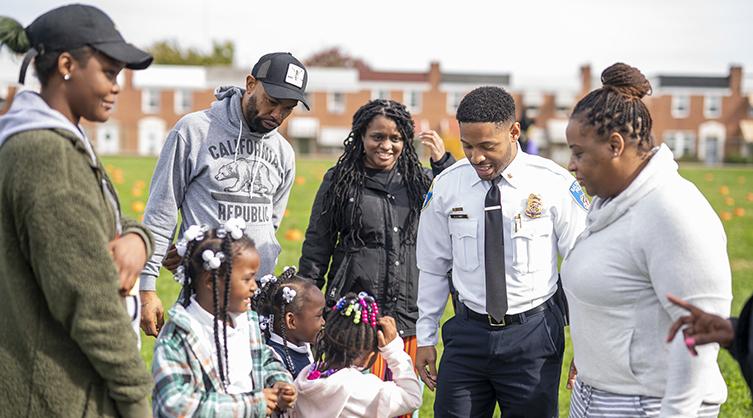Advancing More Equitable Human Services Policies and Programs
Equity and continuous improvement have long been at the heart of AIR's work. Our rigorous methods and approaches to data collection, evaluation, technical assistance, and knowledge dissemination are evolving to better meet the needs of individuals, families, and communities.
In collaboration with our partners, AIR is working to strengthen the evidence base, provide research-backed equity resources, and support equal access to programs that can help people thrive.
Read on to learn how we are advancing equity in human services programs and policies in the areas of education, social justice, and the workforce.
Post-Pandemic Academic Recovery

- Through the COVID-19 and Equity in Education: Longitudinal Deep Dive and the COVID-19 and Equity in Education Research–Practice Partnership Network, our experts are developing an equity-focused research agenda to help advance pandemic recovery efforts.
- The PreK–12 Research on Education Strategies to Advance Recovery and Turnaround (RESTART) Network provides resources to generate new data and evidence to support the urgent post-pandemic academic needs of students, especially those from groups that were disproportionately affected by pandemic-related school closures.
- The Challenges of Implementing Academic COVID Recovery Interventions: Evidence from the Road to Recovery Project, a new paper from the National Center for Analysis of Longitudinal Data in Education Research, sheds light on challenges that schools faced in implementing recovery programs at scale during the 2021–22 school year.
- The PROGRESS Center provides resources and support for local educators and leaders to develop and implement high-quality educational programming for students with disabilities, ensuring all students have free and equitable access to public education. The Center convenes thought leaders—such as educators, researchers, and administrators—to improve support delivery of services and programs to students with disabilities.
- Prioritizing Equity in Post-Pandemic Academic Recovery, an April 2023 webinar, brought together leading voices in the field to share evidence-based solutions to help address learning challenges exacerbated by the pandemic.
Social Justice Reform and Thriving Systems for Youth

Photo courtesy of the Baltimore Police Department
- Three Ways the AIR Equity Initiative is Addressing Justice in Public Safety and Policing is a blog post that explores the AIR Equity Initiative's focus on data gathering and evaluation; strategic partnerships and consultancies with community and industry leaders; and examining the efficacy of community-level programming that integrates socio-historical experiences to rethink traditional policing strategies.
- Building Bridges to Equity: Data-Informed Approaches to Cultivate Peaceful Communities, a two-part webinar hosted by the AIR Equity Initiative, provides diverse perspectives on the role of data and dignity in the current state of public safety systems and envisions data-informed public safety approaches that more equitably respond to the needs of every community.
- AIR’s Justice Systems work spans the justice continuum—from prevention to intervention and reentry—and embeds community-based, restorative, developmentally appropriate, and culturally responsive approaches. We aim to address root causes of harm and trauma and promote equitable access to resources and opportunities that engender safety, dignity, and thriving.
Meaningful Job Training

- The PROMISE Center, a collaborative network of workforce policy experts, practitioners, and policymakers, focuses on creating solutions and using evidence to build an equitable and diverse 21st century workforce system.
- Based on work conducted with the Ohio Department of Education’s Office of Career-Technical Education, The Challenges and Opportunities in Addressing Equity in Career and Technical Education—an “In the Field” piece written by AIR experts—examines opportunities to address equity in career and technical education, including challenges facing states to strengthen outcomes for all students, particularly those who have historically been underserved.
- How States Are Taking an Equity Lens to Expanding Apprenticeship Programs is a blog post that explores specific solutions states have implemented to advance diversity, equity, and inclusion within workforce programs.
- In October 2022, AIR had the privilege of hosting internationally recognized disability rights advocate, Judith Heumann, for a meaningful discussion about her commitment to inclusivity and equity. With trademark honesty and good humor, she shared her life story and offered unique perspectives and insights that are informing the research and technical assistance that we conduct in the areas of education, workforce development, and health.
Looking Forward
We’re eager to continue advancing equitable outcomes for people and communities through work such as the American Rescue Plan National Evaluation, the Center for Youth Justice Transformation, the Evaluation Services of the Health Equity Fund project in Washington, D.C., and the Bridges Collaborative, a coalition that explores desegregation and integration efforts in diverse contexts and aims to advance racial and socioeconomic integration and equity in schools.


